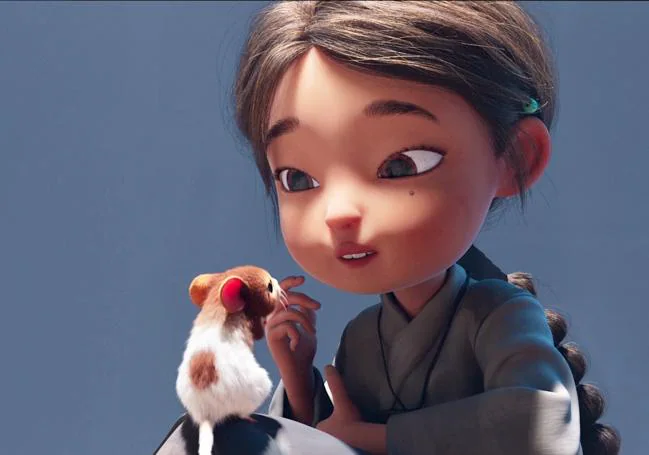At this point, Spanish animated cinema does not have to prove anything. There is 'Planet 51', from the Ilion studios in Alcobendas, which cost 55 million euros and reached 3,400 theaters in the United States. Or 'Klaus', by Sergio de Pablos, with a budget of 40 million contributed by Netflix and an Oscar nomination for animation, a feat that this year has been repeated by the artisanal 'Robot Dreams' by Pablo Berger.
'Dragonkeeper' is around 20 million and could not have been made if it were not a co-production with China. «It's 3 or 4 years and a thousand or so people working. At the European level, a simple, mid-level family animated film does not go below 12 or 13 million. If we want to be more ambitious, it is already 20 or 30,” illustrates its director, Salvador Simó (Barcelona, 1975). How much does a Disney or Pixar film cost? “90, 120 million… Without taking into account the budget for advertising and marketing,” compares the author of 'Buñuel in the Labyrinth of the Turtles', Goya for animation in 2019.
Trailer for 'Dragonkeeper'.
'Dragonkeeper. Guardiana de dragones' opened the Malaga Festival and will reach more than 300 cinemas this Friday, April 19, thanks to A Contracorriente, the largest independent distributor in our country. Its protagonist is a pure-hearted girl, Ping, who maintains a bond with dragons in imperial China 2,500 years ago. The visual workmanship is impeccable and the rhythm is closer to Miyazaki's work than to the frenzy of recent animated films.
“In 'Dragonkeeper' the adventure prevails and the characters rule,” says its author, an admirer of 'The Goonies', 'The Nightmare Before Christmas' and 'My Neighbor Totoro'. “There are moments of humor, but it is the story itself that asks for them, we do not artificially insert one gag after another.” Simó was in charge of the characters when the initially planned director, Ignacio Ferreras ('Wrinkles'), abandoned the project. Collaboration with the Chinese seems complicated.
“Co-direction (with Li Jianping) is relative, because, by contract, the entire narrative and creative part is Spanish,” Simó remarks. «The Chinese made sure that the film was faithful to their culture. Last year we had to go to supervise the team, because Jianping was not there, it is a political position more than anything else. The director explains that now a production of this magnitude could be tackled with Spanish money, but in 2012, when the rights to the Carole Wilkinson literary saga on which it is based began to be negotiated, it was impossible.
The director Salvador Simó.
'Dragonkeeper' had to convince in China and the West. “I don't think Chinese children are less intelligent than those in the rest of the world,” says Salvador Simó ironically. «It is true that culturally they tend to overexplain stories. But China has opened up a lot and young people consume Western products, there is not so much cultural difference anymore.
Artificial intelligence
Studio Ghibli films, the director notes, have a slow pace and kids love them. «The market tends to think that children must be given everything, I try to treat the children's audience with respect. “They are capable of understanding many more things than us with their open and clever minds.” 'Dragonkeeper' is a family film, agreed, “but it also has to excite them intellectually and make them want to see it again, because with each new viewing they discover new things.”
Months before the premiere of a Disney or Pixar production we already know it thanks to merchandising. The 'major' also dominates theatrical distribution, like Sony and Warner. “A Contracorriente and Antena 3 are doing a great job, but it is still the fight of David against Goliath,” laments Salvador Simó. If the theatrical release is still important to publicize a film, in the case of cartoons it is essential. «Look at 'Klaus'. It's a shame it was only seen on Netflix.

Ping, the little protagonist of 'Dragonkeeper'.
Spanish animated cinema “has been fighting for many years and proving that it is at the forefront,” the director congratulates himself. «The Government needs to realize that this is an industry that generates a lot of money and work. Until that happens we will be competitive on a creative level, but not on a commercial level. 'Dragonkeeper' competes with productions of 80 and 90 million. “That is why the Government must do something to prevent the drain of talent.”
Artificial Intelligence is also set to revolutionize image manufacturing in an expensive and laborious genre. Simó, who has worked on the special effects of the 'Pirates of the Caribbean' and 'The Chronicles of Narnia' sagas, is optimistic. «I believe that AI will end up finding its place, you cannot escape from it, you have to use it intelligently, despite the redundancy. In the end, it is one more tool to work faster, but it will never replace the creative part.
#39Dragonkeeper39 #million #euros #draw #SpanishChinese #dragons #truth
